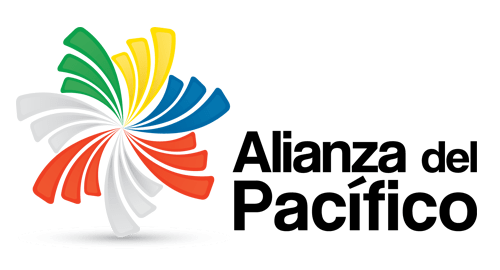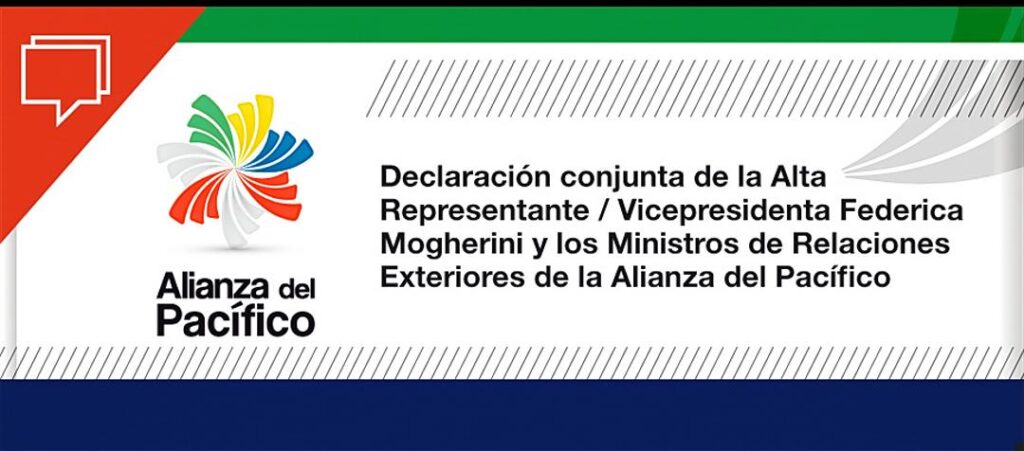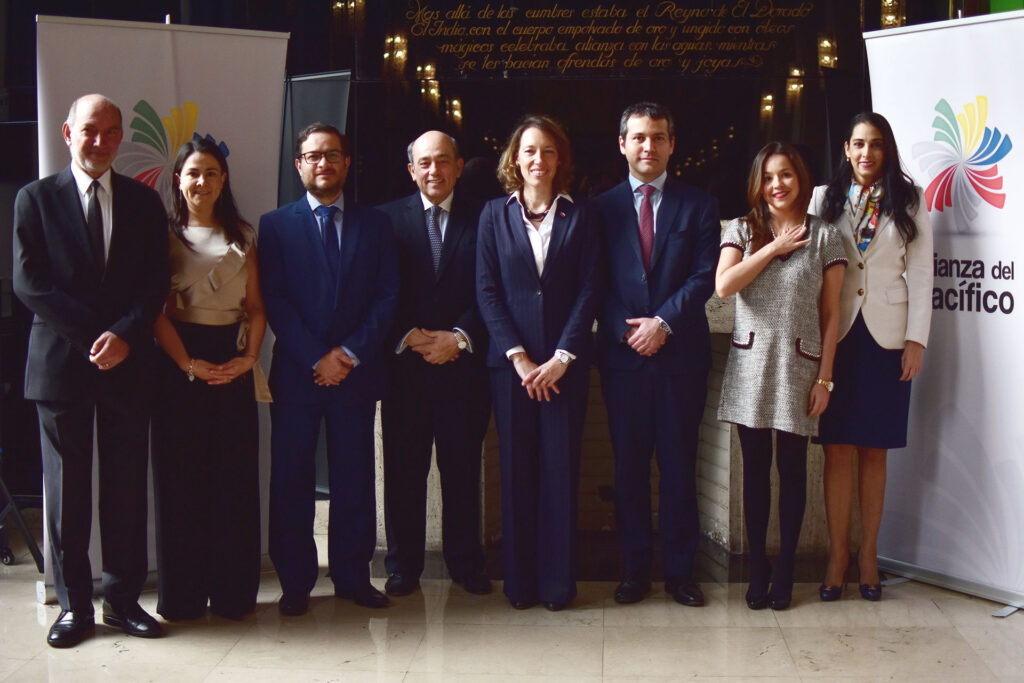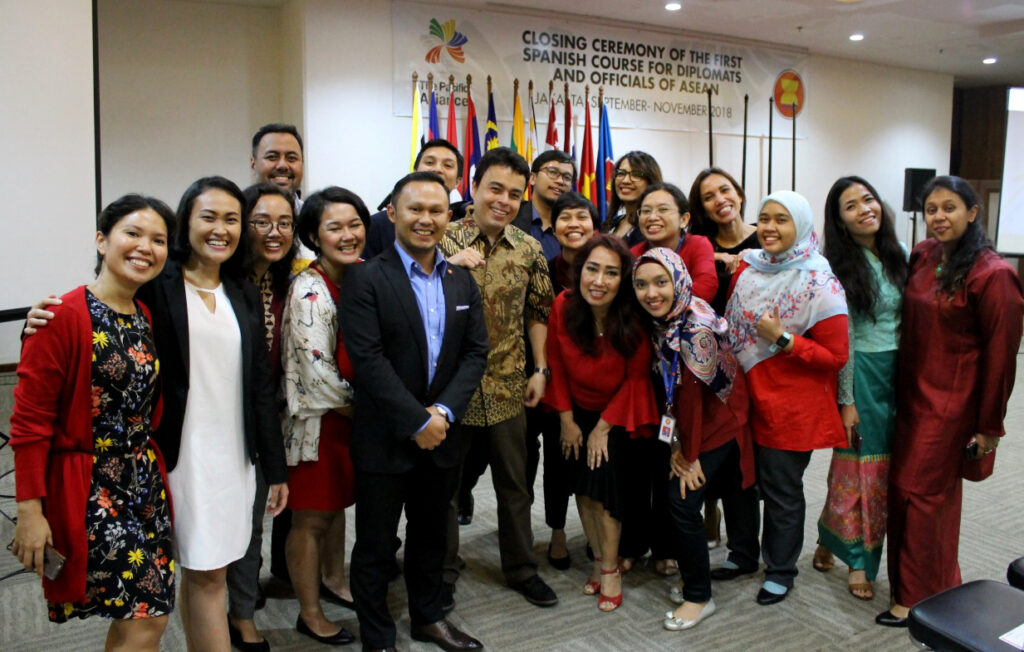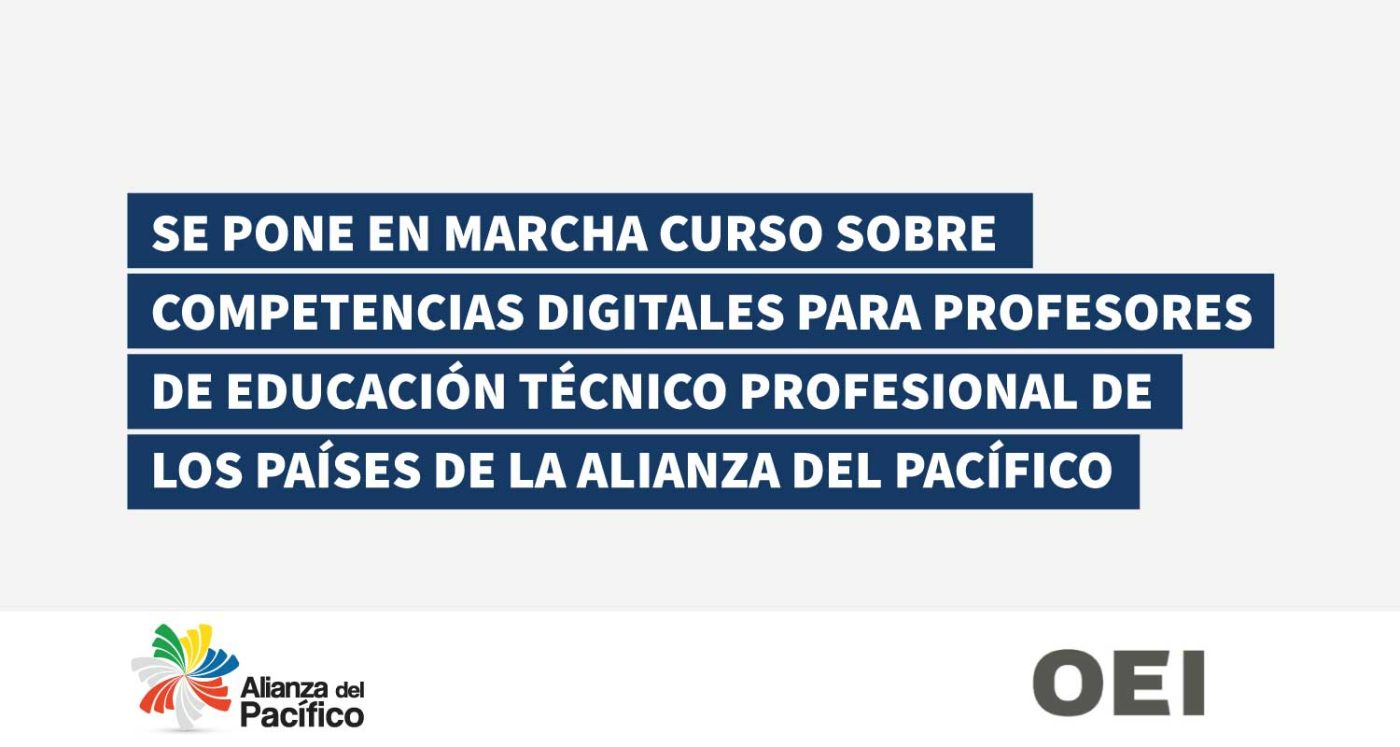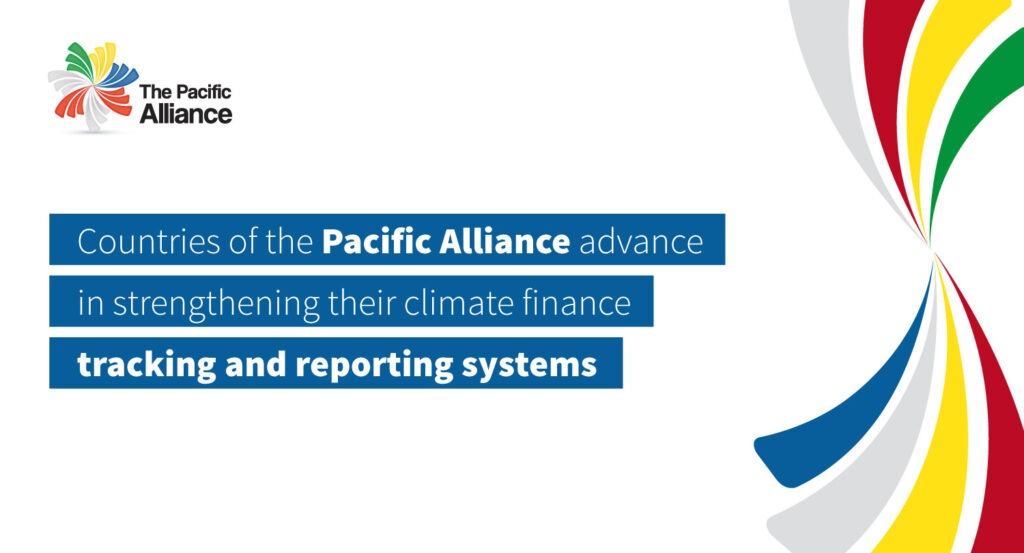Los Presidentes de la República de Chile, Sebastián Piñera Echenique; de la República de Colombia, Iván Duque Márquez; de los Estados Unidos Mexicanos, Andrés Manuel López Obrador; y de la República del Perú, Martín Vizcarra Cornejo, en el marco de la XIV Cumbre de la Alianza del Pacífico, celebrada en Lima, Perú, el 6 de julio de 2019;
DECLARAMOS:
1. Nuestra satisfacción por los logros alcanzados durante estos ocho años para el fortalecimiento de la integración regional, lo cual permite avanzar hacia la libre circulación de bienes, servicios, capitales y personas.
2. Nuestra convicción por continuar promoviendo el libre comercio que contribuye a generar mayor competitividad y desarrollo inclusivo de los países que integramos este mecanismo regional.
3. Nuestro compromiso con la democracia, la separación de poderes y el Estado de Derecho, así como el respeto y la garantía de los derechos humanos que constituyen las bases sobre las cuales se asienta nuestro trabajo conjunto hacia la integración profunda.
4. Nuestra satisfacción por la aprobación del Plan de Trabajo de la Visión Estratégica 2030 que establece una hoja de ruta de la Alianza del Pacífico con miras a ser más integrada, más global, más conectada y más ciudadana.
5. Nuestra convicción de concluir durante el presente año el proceso de negociaciones comerciales con Australia, Canadá, Nueva Zelandia y Singapur, Candidatos a Estados Asociados a la Alianza del Pacífico.
6. Nuestro compromiso de definir, durante el segundo semestre de 2019, los términos de referencia que guiarán las negociaciones comerciales con Corea, Candidato a Estado Asociado a la Alianza del Pacífico.
7. Nuestra bienvenida a Ecuador como nuevo Candidato a Estado Asociado a la Alianza del Pacífico, con miras a su futura adhesión como miembro pleno, lo cual constituye un paso importante para el fortalecimiento de la Alianza. Expresamos nuestro compromiso de definir, durante el segundo semestre de 2019, los términos de referencia que guiarán la negociación, conforme fue comunicado al Ecuador.
8. Nuestro beneplácito por la suscripción de la Declaración Presidencial de la Alianza del Pacífico sobre la Gestión Sostenible de los Plásticos. Este instrumento que ejemplifica el compromiso sostenido de la Alianza del Pacífico y de los Estados Observadores que apoyen este instrumento, con la consecución de la Agenda 2030 y sus Objetivos de Desarrollo Sostenible de la Organización de las Naciones Unidas. Valoramos el compromiso expresado por el Banco Interamericano de Desarrollo (BID) de brindar su apoyo técnico y financiero a la implementación de los objetivos de esta Declaración.
9. Nuestro reconocimiento al Grupo de Trabajo sobre Armonización de la Industria Plástica y la Economía Circular creado por el Consejo Empresarial de la Alianza del Pacífico (CEAP), para afrontar el desafío sobre el tratamiento de estos temas y acompañar los esfuerzos comprometidos por nuestros gobiernos en la Declaración Presidencial de la Alianza del Pacífico sobre la Gestión Sostenible de los Plásticos.
10. Nuestro compromiso por hacer los mayores esfuerzos por conservar y utilizar en forma sostenible los océanos, los mares y los recursos marinos para el desarrollo sostenible, por lo que agradecemos el interés expresado por Australia, Canadá, Indonesia, Japón y Noruega para trabajar conjuntamente hacia el desarrollo de la pesca sostenible y la eliminación de la pesca excesiva, así como la pesca ilegal, no declarada y no reglamentada, de conformidad con el Objetivo de Desarrollo Sostenible N° 14. La Alianza del Pacífico destaca la importancia de unir esfuerzos, en los foros e instancias competentes, en este tema de especial interés para nuestros países.
11. Nuestro pleno respaldo a la presidencia chilena para el éxito de la COP 25 y el convencimiento de que será la ocasión para seguir avanzando en la implementación del Acuerdo de Paris y del Paquete de Katowice para el Clima adoptado en la COP 24, incrementando la ambición en la reducción de niveles de emisiones de gases efecto invernadero y la capacidad de adaptación y resiliencia frente al cambio climático, generando respuestas globales a los efectos del cambio climático en áreas prioritarias como la adaptación, protección de los ecosistemas, la biodiversidad, los bosques y el agua, en el marco de las políticas climáticas adoptadas por los Estados desde todos los niveles de gobierno.
12. Nuestro respaldo a la constitución del Grupo Técnico de Desarrollo e Inclusión Social, cuya agenda se alinea a nuestro objetivo fundacional de lograr un mayor bienestar y desarrollo sostenible, la superación de la desigualdad económica y la inclusión social de nuestros ciudadanos.
13. Nuestro reconocimiento a los avances alcanzados en el diseño e implementación de una Plataforma Virtual, que ayude a quienes conformamos la Alianza a estar más conectados y a optimizar la sistematización de nuestras comunicaciones y documentación.
14. Nuestra satisfacción por la incorporación de Armenia, Azerbaiyán, Filipinas y Kazajstán como nuevos Estados Observadores de la Alianza del Pacífico, contando actualmente con 59 países observadores de los cinco continentes, lo que refuerza nuestro rol como plataforma de integración económica y comercial con proyección estratégica al mundo.
15. Nuestro reconocimiento a los Estados Observadores, bloques económicos y organismos internacionales que participaron en el I Foro Técnico de Cooperación que se realizó en Lima los días 23 y 24 de abril de 2019, permitiendo que la Alianza del Pacífico potencie su rol frente a otros actores y promueva su primer Portafolio de Proyectos, consolidando así su rol dual de demandante y oferente de cooperación.
16. Nuestro beneplácito por la adopción de las Declaraciones Conjuntas con el Japón, la Comisión Económica Euroasiática y la Organización para la Cooperación y el Desarrollo Económicos (OCDE), las cuales permiten enriquecer nuestra proyección externa con miras a fortalecer la cooperación, las oportunidades de comercio y la competitividad con Estados Observadores, bloques regionales y foros internacionales, en beneficio de los ciudadanos.
17. Nuestro reconocimiento por los siguientes logros alcanzados en el último año:
– Puesta en marcha del Consejo de Cooperación, instancia que dinamizará y hará más eficiente el relacionamiento con los Estados Observadores, y promoverá la implementación de programas y proyectos de cooperación.
– Entrada en vigor del Acuerdo para el establecimiento del Fondo de Cooperación de la Alianza del Pacífico, que permitirá impulsar nuevos proyectos y promover iniciativas en beneficio del ciudadano.
– Publicación de la Guía de Contrataciones Públicas en la Alianza del Pacífico, que permite aprovechar las oportunidades de negocios que se deriven de los mercados de contrataciones públicas de la Alianza del Pacífico.
– Suscripción del Memorando de Entendimiento relativo al reconocimiento de buenas prácticas gubernamentales y al desarrollo de mecanismos de cooperación para la prevención y lucha contra la corrupción en los sistemas de contratación públicas en la Alianza del Pacífico.
– Publicación del Índice de Políticas Públicas para el Desarrollo de la Pyme en la Alianza del Pacífico, en coordinación con la Organización para la Cooperación y el Desarrollo Económicos (OCDE), con el apoyo del Banco de Desarrollo de América Latina (CAF) y el Sistema Económico Latinoamericano y del Caribe (SELA).
– Elaboración del estudio sobre Fortalecimiento y Articulación Regional de los Centros de Desarrollo Empresarial en los Países de la Alianza del Pacífico, que diseña una estrategia de inter-operatividad y articulación regional para la internacionalización de las PYMES.
– Suscripción del Memorando de Entendimiento para la Creación de la Red de Plataformas Tecnológicas para Trámites Empresariales de la Alianza del Pacífico.
– Otorgamiento de recursos, a través del Fondo Capital Emprendedor, para las primeras ocho MIPYMES que podrán financiar y desarrollar sus proyectos.
– Implementación del esquema electrónico para la interoperabilidad de certificados de origen y certificados fitosanitarios, con lo cual se elimina el uso de papel en las operaciones de comercio exterior que los requieran.
– Armonización de los datos de las declaraciones aduaneras de los países de la Alianza del Pacífico, con lo cual se iniciarán los trabajos de desarrollo informático de acuerdo con la priorización de las administraciones aduaneras.
– La conclusión del Estudio de Identificación de Potenciales Encadenamientos Productivos entre los países de la Alianza del Pacífico para aprovechar los mercados de China, Corea, Japón y Tailandia.
– Implementación del Programa de Licitaciones Internacionales – Alianza del Pacífico, con el objetivo de apoyar a las empresas de la Alianza del Pacífico en su proceso de internacionalización.
– Lanzamiento de la Plataforma “Export Access”, que permite el acceso a información sobre requisitos no arancelarios de más de 900 productos; facilitando la identificación de oportunidades comerciales en toda la región de las Américas.
– Puesta en marcha del esquema de capacitación e intercambio de experiencias en facilitación de comercio y materia aduanera en la Alianza del Pacífico.
– Intercambio de experiencias y buenas prácticas en seguridad turística vinculada a la gestión de desastres, con el fin de fortalecer la resiliencia de la industria turística en la región, en colaboración con la Organización de los Estados Americanos (OEA).
– Realización del IV Foro de la Alianza del Pacífico de Estadísticas de Turismo cuyo objetivo principal fue el intercambio de conocimientos estadísticos que permitan fortalecer la toma de decisiones en cuanto a la política turística de los países miembros de la Alianza Pacífico.
– Suscripción del Memorando de Entendimiento de Cooperación en el Campo de los Medios de Comunicación de la Alianza del Pacífico, mediante el cual Televisión Nacional de Chile, la Radio Televisión Nacional de Colombia, el Sistema Público de Radiodifusión de México y el Instituto Nacional de Radio y Televisión del Perú, expresan su deseo de colaborar con la finalidad de obtener beneficios recíprocos.
– Publicación de los Lineamientos de Comunicación y el Glosario de la Alianza del Pacífico que proporcionan un marco básico para la difusión de mensajes clave dirigidos a públicos objetivos de interés para el mecanismo.
– Organización de múltiples actividades de promoción lideradas por nuestras representaciones diplomáticas, consulares y agencias de promoción, que contribuyen a proyectar a la Alianza del Pacífico al mundo, así como promover nuevas oportunidades para nuestros empresarios y ciudadanos.
– Realización de la VI Macrorrueda de Negocios de la Alianza del Pacífico; en la que se concretaron alrededor de 6000 citas entre los más de 600 empresarios asistentes, con una expectativa de negocios de US$ 120 millones.
– Conformación y puesta en marcha de la Red TransferenciAP, que es una plataforma para promover y facilitar la transferencia tecnológica, tanto en los mercados de los países de la Alianza del Pacífico como otros mercados de interés, aportando a la competitividad y al desarrollo económico.
– La implementación de la plataforma tecnológica de Intercambio de Información entre los Equipos de Respuesta a Incidentes Cibernéticos, y del Plan de Trabajo para el desarrollo del reconocimiento transfronterizo de firma electrónica avanzada o firma digital.
– La instalación del mecanismo permanente de interlocución público-privada entre el Grupo Técnico de Servicios y Capitales y el Consejo Empresarial de la Alianza del Pacífico para trabajar en la Instancia de Facilitación de la Inversión de la Alianza del Pacífico (IFIAP).
– Conformación de la Red de inglés para el fortalecimiento de la formación lingüística y metodológica de los docentes de inglés de educación técnico-profesional y tecnológica.
– Conformación del grupo de especialistas para la articulación entre los sectores productivo y educativo de los países de la Alianza del Pacífico, cuyo objetivo es impulsar la asistencia técnica por parte de los Estados Observadores a través de diversas acciones.
– Publicación de material gráfico con el objetivo de visibilizar y revalorizar la Educación Técnica Profesional.
– Celebración de la Reunión de Alto Nivel por la Empleabilidad Juvenil y del IV Encuentro de Jóvenes, en el marco de la cooperación con Suiza y con el apoyo del sector privado, con el objetivo de promover la empleabilidad, la movilidad laboral y el acceso de los jóvenes a un empleo digno y de calidad. El Acuerdo por la Empleabilidad Juvenil de la Alianza del Pacífico beneficiará a 35 mil jóvenes con oportunidades de desarrollo profesional, en el período 2017 al 2020.
– El fortalecimiento del Consejo de Ministros de Finanzas a través del establecimiento de los reglamentos de esta instancia, sus grupos de trabajo y su Secretaría Técnica, lo que contribuirá a asegurar su debido funcionamiento y facilitar la consecución de resultados en materia económica y financiera.
– La implementación de un mecanismo de acercamiento entre el Consejo de Ministros de Finanzas de la Alianza del Pacífico y el Proceso de Ministros de Finanzas del Foro de Cooperación Económica Asia-Pacífico (APEC), el cual promoverá la realización de actividades de colaboración en asuntos financieros con las 21 economías de la región de Asia-Pacífico.
– La elaboración de una agenda que compila aspectos normativos y operativos cuya implementación será analizada, de forma prioritaria, para continuar avanzando con el proceso de profundización e integración de los mercados de capitales de la Alianza del Pacífico.
– El compromiso de los Ministerios de Finanzas en trabajar hacia el establecimiento de mecanismos de intercambio de información ante amenazas e incidentes cibernéticos que afecten el sistema financiero y el mercado de capitales de la Alianza del Pacífico.
– La adopción de una guía de buenas prácticas que contempla métodos alternativos de obtención de datos financieros de las micro, pequeñas y medianas empresas, a ser utilizados por las entidades financieras, con miras a mejorar el proceso de evaluación crediticia de este tipo de empresas y facilitar su acceso a productos financieros.
– Los avances en el proceso de evaluación de la factibilidad de potenciales mecanismos financieros, que pudieran ser implementados, de manera conjunta, entre los países de la Alianza del Pacífico, para acceder a recursos regionales e internacionales enfocados en apoyar acciones de mitigación y adaptación al cambio climático.
– La identificación de las divergencias normativas y operativas en el tratamiento del Impuesto al Valor Agregado a la exportación de servicios en los países de la Alianza del Pacífico, que servirán para evaluar, de manera conjunta, medidas que permitan una mayor homologación tributaria.
– El compromiso de los países de trabajar para que la solicitud de emisión de certificados de residencia y la entrega de dichos documentos se realicen mediante medios electrónicos en el mediano plazo.
– La adopción de principios orientadores de las Asociaciones Público-Privadas (APP) de la Alianza del Pacífico, que contribuirán a que los países miembros fomenten la predictibilidad, la transparencia, la competencia y la integridad en los procesos de provisión de infraestructura bajo esta modalidad de contratación.
– Los avances en el proceso de selección de la entidad modeladora que llevará a cabo la evaluación técnica para la adopción de un mecanismo de transferencia de riesgo, de manera conjunta, para la cobertura de eventos hidrometeorológicos.
– El consenso para adecuar la elaboración de bases de datos de activos públicos a las mejores prácticas internacionales, a fin que éstas permitan a los gobiernos cuantificar sus pasivos contingentes, definir estrategias de protección financiera y promover políticas eficientes de aseguramiento.
18. Nuestro reconocimiento por los significativos avances alcanzados en el objetivo del Perú por incorporarse como miembro de la OCDE, expresando nuestro pleno respaldo a esta aspiración que compartimos y que impulsará, aún más, el posicionamiento de la Alianza del Pacífico en el escenario internacional.
19. Nuestro reconocimiento y respaldo a la aspiración de Colombia por incorporarse como miembro al Foro de Cooperación Económica del Asia-Pacífico (APEC), lo que consolidaría el posicionamiento de la Alianza en la Cuenca del Pacífico.
20. Nuestra satisfacción por la suscripción de la Declaración sobre el Sistema Multilateral de Comercio, estando firmemente convencidos de la importancia, predictibilidad y solidez que brinda la Organización Mundial de Comercio al comercio internacional.
21. Nuestro respaldo al proceso de internacionalización de las PYMES que se viene trabajando en la Alianza del Pacífico, que contará a partir de este año con el apoyo del Banco de Desarrollo de Latinoamérica – CAF, que permitirá acceder a líneas de crédito en condiciones y plazos favorables, así como capacitación y asesoría especializada.
22. Nuestro agradecimiento al valioso apoyo y cooperación brindado por el Banco Interamericano de Desarrollo (BID); el Banco de Desarrollo de América Latina (CAF); el Sistema Económico Latinoamericano y del Caribe (SELA); y, el Banco Mundial (BM). Confiamos en continuar reforzando este relacionamiento con los organismos internacionales de manera amplia y permanente para el efectivo cumplimiento de nuestros objetivos.
23. Nuestro reconocimiento al apoyo del Observatorio Estratégico de la Alianza del Pacífico por su aporte desde la academia a la agenda de nuestro mecanismo de integración.
24. Nuestro reconocimiento a la participación y la importancia para nuestro mecanismo y su proceso integrador del Consejo Empresarial de la Alianza del Pacífico (CEAP), que se expresa en la presentación de importantes iniciativas, entre las que destaca la celebración del VI Encuentro Empresarial con la participación de empresarios de la región y de otras partes del mundo, y su compromiso con la implementación de normas voluntarias que promuevan el uso sostenible y eficiente del agua por parte del sector empresarial de la Alianza del Pacífico, dentro de los que se encuentra el Certificado Azul.
25. Nuestro agradecimiento a la República del Perú por el ejercicio de la Presidencia Pro Tempore de la Alianza del Pacífico desde julio del 2018 y nuestra disposición para acompañar a la República de Chile en esta tarea de la que estará a cargo a partir de hoy.
26. Nuestro aprecio y reconocimiento a las autoridades y población de Lima, y al Gobierno del Perú por la hospitalidad y el apoyo para la realización exitosa de la XIV Cumbre de la Alianza del Pacífico.
Sebastián Piñera Echenique, Presidente de la República de Chile
Iván Duque Márquez, Presidente de la República de Colombia
Andrés Manuel López Obrador, Presidente de los Estados Unidos Mexicanos
Martín Vizcarra Cornejo, Presidente de la República del Perú

